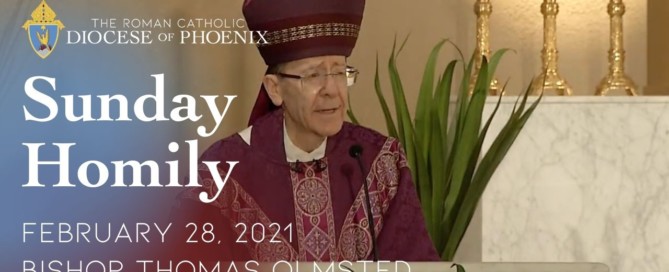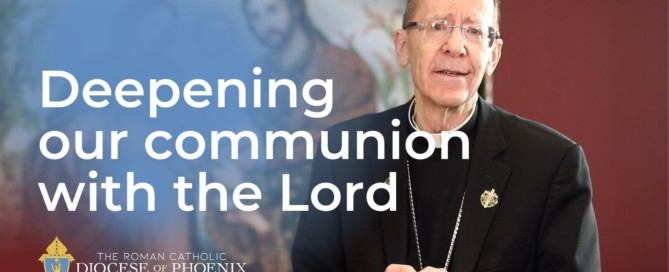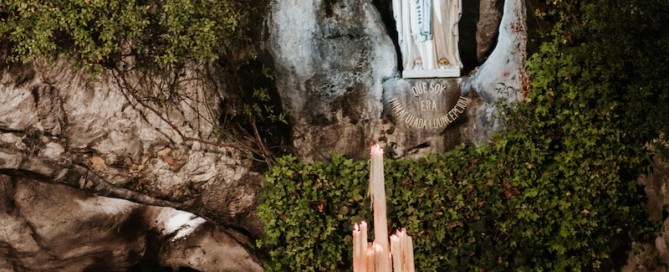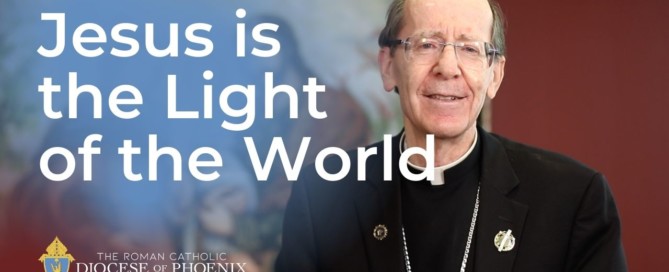Welcome to Our New Website!
Four ways to help a hurting neighbor – with tax credits and endowments
Four ways to help a hurting neighbor – with tax credits and endowments
Thanks to Arizona’s tax credit program, taxpayers can make a big difference with their dollars.
There are few greater joys for a mission than bringing hope and healing to the underserved. But positive outreach to struggling neighbors has become a challenge this past year. The global health pandemic has made it difficult for many people to find the services they need.
Approximately 1.1 million Catholics make The Diocese of Phoenix a diverse, vibrant and faith-filled community. Together they’ve built some of the most impactful schools, organizations and charities in Phoenix. The Diocese provides hands-on help for seniors, those who are homeless, those who have lost jobs, women who have been abused and families in crisis.
Serving the Diocese are four vital and engaged nonprofits. Learn how these organizations are making a difference and how you, too, can be part of the solution that helps make a difference in the lives of others through tax credits, donations and endowments.
Love surpasses Understanding
Following is the prepared text from Bishop Olmsted’s homily for the 2nd Sunday of Lent.
Love surpasses Understanding
February 28, 2021
“God did not spare His own Son but handed Him over for us all.” – Rom 8:31
With these words, St. Paul teaches us a primary truth about God and a primary truth about love. God did not spare His own Son, but He did spare the only son of Abraham.
Abraham had only one son, Isaac. It was the son of his old age. For years, Abraham and Sarah had waited and prayed and longed for a son. Only when Sarah was so old that it seemed impossible for her to bear a child did God bless them with Isaac.
The love of Abraham and Sarah for Isaac knew no bounds. It was more than words could express.
Abraham, by God’s Providence, had accomplished great things in his life: traveling to a new land, beginning a new nation, earning the respect and honor of many. But all that seemed like nothing compared to the joy of having a son.
Then, one day God tested Abraham’s faith. He asked him to sacrifice his son: “Take your son, your only one, whom you love, and go to the land of Moriah. There you shall offer him up as a holocaust (Genesis 22:2).” What a strange request! What a cruel request! What kind of God is this – who destined events to unfold in such a way that Abraham would have the most profound love a father could have for his son – and then ask him to sacrifice that beloved son?! Abraham could not understand. Nevertheless, he obeyed. He trusted God so much that he obeyed even when he did not understand, when it made no sense to him. Out of faith, Abraham set out for the land of Moriah, the place of sacrifice. But then, God intervened and spared Abraham’s son. God rewarded his faith.
But “God did not spare His own son.”
We proclaim that mystery of love, literally from our rooftops, when we erect a Cross at the pinnacle of our churches. And we sing this mystery at the heart of the Eucharist: “We proclaim your Death, O Lord, and profess your Resurrection until you come again.” This is the mystery of faith. “God did not spare his own Son.” It is the heart of the “Good News.” But why? What is good about the Father not sparing His own Son? Would it not be good, even better, to spare the Son? Does this sound like love? How can this be Good News? Because of the Blessed Trinity. Because of the great mystery of one God and three divine persons, which is at the same time, the mystery of love.
The Trinity
When God did not spare His own Son, He did not spare Himself. In the Trinity, the Father and the Son and the Spirit are one, eternally one. Whatever the Father does, the Son does; whatever the Son does, the Father does. As Jesus says: “I am in the Father and the Father is in me.” So, when God did not spare His Son, He did not spare Himself. God gave the gift of Himself to us in sacrifice. That is how God saved us; and that is why the Cross is the heart of our faith.
God, then, was not playing a cruel trick on Abraham. He was inviting Abraham to glimpse Divine love; and in a mystical yet concrete way to experience the love that created the human race and redeemed it through the Cross and Resurrection. As Jesus told Nicodemus (Jn 3:16), “God so loved the world that He gave His only Son, so that everyone who believes in Him might not perish but might have eternal life.”
In today’s Gospel, we see Jesus giving Peter, James and John a vision of the love between Him and His Father. Jesus leads these three Apostles up a mountain and before their eyes He displays in a partial way the splendor of the love of the Trinity.
Jesus, in His human nature, is transfigured by the Father’s love: His clothes become dazzlingly white; Moses and Elijah appear with Him in conversation; and the voice of the Father is heard, saying: “This is my Beloved Son, listen to Him.”
The splendor of the Father’s love for Jesus is made visible for Peter, James and John to see and made audible for them to hear. But why? So that they would not be scandalized by Jesus’s death on the Cross – the greatest act of love. Prior to Jesus’ Resurrection, the Apostles could not begin to understand the Cross. But the Transfiguration was preparing them to trust even when scandalized by such great suffering.
The Trinity is the most profound of mysteries, the most amazing reality, indeed the foundation of all reality. It is a mystery so deep that there is no limit to the Love: “God did not spare His own Son.” It is a love so strong that death cannot defeat it. Death did not separate Jesus from His Father. It never could; for Jesus and the Father are one from all eternity and forever. However, the Cross did conquer sin and redeem the human family. What wondrous love is this!
Obedience
At the time of the Transfiguration God the Father not only says, “This is my beloved Son” he also says: “Listen to Him.” In other words, be like Abraham. Abraham listened and obeyed even though he did not understand. But, in and through obedience, Abraham began to understand God in a far deeper way. Obedience precedes understanding. We do not obey because we understand. We obey because we believe, because we trust God. And only after we obey do we begin to understand why God asked us to do something. When we live by faith, repeatedly in life we will see this come true.
For example, when Dr. John Haas became a Catholic, he did not understand why contraception was wrong. Prior to entering the Church, he and his wife had even come to think that practicing contraception was what they should do to keep the world from getting over-populated. But he continued to study the Church’s teachings and to pray for the gift of faith; and one day he came to this insight of faith. He said to his wife: “We have come to believe everything that the Church teaches except this. It all makes sense to us except this. But if all the rest is true, then this must be true as well, even though we do not understand. So, let us put our trust in God.”
And so, they did; they came into full communion with the Church. And as they obeyed the Church’s teaching on marriage, remaining open to the gift of children, it came to make sense. Many other aspects of life also took on new meaning, far beyond what they could have imagined. Obedience precedes understanding. They had to obey before they could begin to understand. They followed the example of Sarah and Abraham. Obedience, like the Blessed Trinity, is an experience of the mystery of sacrificial love. You and I are made in the image of God. And we have been given the theological virtues of faith and hope and love. At times, we will be asked by God to do things we do not understand, to bear sorrows that break our heart, to trust God when others think we are foolish. At those times, let us pray for the grace to be like Abraham, our Father in faith. And let us always remember St. Paul’s words, “Brothers and sisters, if God is for us, who can be against us? He who did not spare His own Son but handed Him over for us all, how will He not also give us everything else along with Him.” With St. Faustina, we say, “Jesus, we trust in you.”
“Belong to God or be under the evil one.”
Following is the prepared text from Bishop Olmsted’s homily for the 1st Sunday of Lent.
“Belong to God or be under the evil one.”
February 21, 2021
To win any war, says Peter Kreeft, you need to know three things:
- that you are at war,
- who your enemy is; and
- what weapons can defeat the enemy.
The first line of today’s Gospel (Mk 1:12) helps us to answer Kreeft’s first question, are we at war? It says: “The Spirit drove Jesus into the desert, and He remained there for forty days, tempted by Satan.” Actually, the battle with the evil one started a long time ago. The Catechism tells us: By the sin of Adam and Eve,
“…the devil has acquired a certain domination over man, even though man remains free… Ignorance of the fact that man has a wounded nature inclined to evil gives rise to serious errors in the areas of education, politics, social action, and morals. …This dramatic situation of ‘the whole world which is in the power of the evil one’ makes man’s life a battle” (CCC 407, 409).
This battle was particularly evident in the first days of Jesus’ ministry. That is why, on the First Sunday of Lent, the Church reminds us of the battle that Jesus waged with the powers of darkness, when He was tempted by Satan, greatly tested, but won. His battle with Satan was the first act of His messianic mission from the Father, His first step in redeeming the world.
That Jesus engaged in battle with Satan was clearly the will of the Father and the Holy Spirit, to set aright the fatal mistake of our first parents. Just as Adam and Eve lost the first battle with Satan and were “driven out of the garden of Eden, so “the Holy Spirit drove Jesus out into the desert” where He defeated the kingdom of Satan by resisting the devil’s temptations, and then beginning the Kingdom of God.
The victory of Jesus over Satan’s temptations not only teaches us that He had power to conquer evil, but also that He continues to do so in His Mystical Body, the Church. It reminds us of what Ben Sirach told his son as recorded in the Old Testament Book of Sirach, (Sir 2:2), “My son, if you endeavor to serve the Lord, prepare yourself for an ordeal.” In His love for us, God allows us to be tempted so that we can learn how to win the battle with evil by remaining always in union with Him. So, the first question the Lord Jesus poses to us today is what the Church asks every catechumen just before Baptism: “Do you renounce Satan, and all his works, and all his empty show?” To belong to Christ requires a willingness to be at war against Satan, against his temptations to hatred, lies, impurity, apathy, selfishness and all that stands contrary to the Kingdom of God. Whoever wants to love Christ must be prepared for an ordeal. At the heart of Christ’s love for the world is the mystery of the Cross.
To win any war, the second question we must answer correctly is this: who is the enemy? St. Paul tells us who our enemy is not; he writes (Eph 6:12), “Our battle is not against human forces but against the principalities and powers, the rulers of this world of darkness, the evil spirits in regions above.” May we always keep in mind that our battle against evil is “not against human forces”. To be sure, Satan makes use of human beings to wage His war against God, and makes it seem as if humans are our enemy. We may think, for example, “If only I did not have this father, or this wife, or this brother or this neighbor, or whomever, then I would be happy.” We must resist the temptation to blame other people for our struggles. Unless we know who the enemy is, not only shall we be fighting the wrong foe, but we shall also be blind to the real threat to happiness and fullness of life in Christ. The battle against Satan is much more dangerous than battling a human foe. Listen to St. Peter’s words (I Pet 5:8-9), “Stay sober and alert. Your opponent the devil is prowling like a roaring lion looking for someone to devour. Resist him, solid in your faith.”
This brings us to the third thing needed to win the battle: we need to know what weapons can defeat the enemy: The answer is revealed during Mass when the priest lifts the sacred host and says: “Behold the Lamb of God, behold Him who takes away the sins of the world. Blessed are those called to the supper of the Lamb.” In the Eucharistic Sacrifice, Christ makes present the victory of His death and Resurrection, by which He redeemed the world, and definitively defeated the forces of evil. We begin to share in this great victory of Christ when we are baptized. In Confession, too, and the Eucharist, we behold this triumph of God’s love coming to us in what seems to the world like weakness, but is, in fact, the power and the mercy of God.
The Lord could have come in the kind of power that sows terror but instead He came as a servant, gentle and humble of heart.
So, how can we win the battle against temptation? The Catechism of the Catholic Church tells us (#2849): “Such a battle and such a victory become possible only through prayer. It is by His prayer that Jesus vanquishes the tempter.” When He teaches us to pray in the Our Father, “Lead us not into temptation, Christ unites us to His battle and His agony. He urges us to vigilance of the heart in communion with His own.” When we remain one with Christ through faith, prayer and the Sacraments, the Lord accomplishes things far beyond what we can ask or imagine.
Let us not forget that the first goal of Lent is to intensify our love of Jesus, to deepen our desire and longing for Him. Our First Reading from the Book of Genesis assures us that our longing for union with Him is nothing compared to His desire for union with us. Six times God repeats the word “covenant” as He promises Noah a sign that every person can see in the sky, “I set my rainbow in the clouds to serve as a sign of the covenant between me and the earth.” In the Eucharist, we have the new and eternal covenant with God.
On this first Sunday of Lent 2021, let us remember that our Redeemer is drawing near to us, every day, breaking into our lives, bringing to completion His victory over sin and death. That’s why His first words recorded by St. Mark are: “This is the time of fulfillment. The Kingdom of God is at hand. Repent and believe in the Gospel.”
Indeed, in the Sacraments, especially Baptism, Confession and the Eucharist, the power of Christ’s love is unleashed anew in our world. He offers us the grace to turn our lives away from the darkness and to find in Him the Light and Life of the world. This grace is offered especially to our catechumens but also as fresh renewal of the faith of us all. Indeed, “This is the time of fulfillment. The Kingdom of God is at hand.”
NEW: Bishop Olmsted invites us to commit to prayer, penance and almsgiving during Lent
NEW: Bishop Olmsted invites us to commit to prayer, penance and almsgiving during Lent
Starting on Ash Wednesday and ending on Holy Thursday, the Church asks us to commit to the three pillars of Lent: prayer, penance and almsgiving. All three require little efforts but significant ones. They aim at deepening our communion with the Lord and at preparing us to celebrate the great mystery of love revealed in the suffering, death and Resurrection of Jesus. As we journey together through Lent, let us ask for the continued intercession of the Blessed Virgin Mary, that she will lead us to an even deeper encounter with her Son Jesus.
Read “O Sacred Feast,” the Pastoral Letter from Bishop Olmsted.
“Jesus, you can make me clean.”
Following is the prepared text from Bishop Olmsted’s homily for the 6th Sunday in Ordinary Time.
“Jesus, you can make me clean.”
February 14, 2021
“A leper came to Jesus…” (Mk 1:40)
Would the leper have come if he were not suffering from a dreadful disease? Does bad health hinder or help our faith? Was leprosy the catalyst that made the leper aware of his need for God? Did it awaken in him a desire for the cleansing of his soul? Was desire for bodily and spiritual healing what led him to faith in Jesus? It seems to be so; notice what his actions and words tell us: “…kneeling down [he] begged Jesus and said, ‘If you wish, you can make me clean.” The man desired more than freedom from leprosy; he wanted to be cleansed of sin.
Could the Lord be doing something similar in your soul and mine when we are suffering? When we ourselves or someone we love gets sick, does it bring us to our knees? The man with leprosy in today’s Gospel not only came to Jesus but, by kneeling and in words, he showed his belief in Him as Lord: “If you wish, you can make me clean.” Many who came to Jesus were motivated by both faith and a need for healing. They believed in Jesus’ power to heal both body and soul; and they trusted He would not recoil in fear and disgust at the contagious nature of their suffering.
Think about the great variety of people who sought Jesus out for healing:
- Four men carried a paralytic to Him and when a huge crowd prevented their getting near, they opened up the roof above Him and let down the mat on which the man was lying. Because of their “faith”, Jesus forgave the man’s sins and then healed him of physical paralysis.
- When a woman with a hemorrhage touched His clothes, Jesus answered her desire for healing, telling her, “Daughter, your faith has saved you. Go in peace and be cured of your affliction” (Mk 5:34).
- When two blind men heard that Jesus was passing by, they cried out, “Son of David, have pity on us,” and Jesus replied, “Let it be done for you according to your faith” (Mt 9:27ff).
- Time after time, “…healing infirmities or forgiving sins, Jesus always responds to a prayer offered in faith” (CCC, 2612).
Jesus paid a price for answering the prayers of those whom He healed. As a result (Mk 1:45), “it was impossible for Jesus to enter a town openly. He remained outside in deserted places.” The alienation and isolation suffered by lepers and others, Jesus took upon Himself. The lepers, having been freed of their afflictions, could return home, but Jesus could not, not until He paid the price of our salvation on the Cross.
My sons and daughters in Christ, may we never hesitate to come to Jesus for healing, never allow our shame or the attitudes of others water down our faith. Let us keep in mind what Jesus tells the leper today (Ibid), “I do will [to cleanse you]. Be made clean!” Jesus hears us whenever, wherever and however we cry out to Him in faith. Remember His words: “Ask and it will be given to you; seek and you will find; knock and the door will be opened to you.”
Jesus loves us with a love that far surpasses all we can hope for or imagine. His love reaches even unto death on the Cross. When we feel burdened by our sins, He wants us to come to Him without fear. Let us imitate the good thief, who in the last hours of his life on earth, said to Jesus on the cross beside him (Lk 23:42f), “Jesus, remember me when you come into your Kingdom.” At once, Jesus replied, “Amen, I say to you, today you will be with me in Paradise.” After a life of crime and misery, the thief received from God the grace to trust Jesus like a little child. Jesus’ love for us is no less than His love of the good thief. Jesus wants to cleanse us of whatever makes us unclean or fills us with loneliness or shame. He longs to show us that His love is stronger than sin and more powerful than our feelings of rejection or isolation. He wants us to hear His voice (Mt 11:28), “Come to me, all you who are burdened, and I will give you rest.”
At the Last Supper, just before dying on the Cross to redeem the world, Jesus assured the Apostles (Jn 14:12-13), “…whatever you ask in my Name, I will do, so that the Father may be glorified in the Son. If you ask anything of me, in my Name, I will do it.”
When we pray as Jesus taught us, when two or three gather in His Name as we are doing now, may we never worry that we are asking for too much from the Lord. Let us only be concerned that we come to Him with faith like that of a child. Remember St. Paul’s words to the Romans (Rom 8:31-2), “If God is for us, who can be against us? He who did not spare His own Son but handed Him over for us all, how will He not also give us everything else along with Him?”
Jesus remains with us through His Church. Wherever He is present, there is mercy, there is peace. In the last line of the Gospel today, we are told: “…people kept coming to [Jesus] from everywhere.” This is what I pray will happen during the Lenten season, which begins this next Wednesday. May the Spirit keep moving hearts to hear those words of Jesus, “Come to me; I will give you rest.”
Pope Francis and the Diocese of Phoenix urge prayers and solidarity for the sick, their caregivers and health care workers
Pope Francis and the Diocese of Phoenix urge prayers and solidarity for the sick, their caregivers and health care workers
February 11, 2021 | En Español
 As we commemorate this 29th annual World Day of the Sick, the Roman Catholic Diocese of Phoenix unites with His Holiness Pope Francis in praying for those who are sick and homebound, their caregivers, and health care professionals everywhere. The COVID-19 pandemic is an important reminder to come together in prayer and empathy for those around the world, and to place our trust in Jesus, the Divine Physician.
As we commemorate this 29th annual World Day of the Sick, the Roman Catholic Diocese of Phoenix unites with His Holiness Pope Francis in praying for those who are sick and homebound, their caregivers, and health care professionals everywhere. The COVID-19 pandemic is an important reminder to come together in prayer and empathy for those around the world, and to place our trust in Jesus, the Divine Physician.
Today on her feast day under the title of Our Lady of Lourdes, we pray for the intercession of the Blessed Virgin Mary, asking her to shelter us under the mantle of her protection and to lead us to a meaningful encounter with her Son, our Lord Jesus Christ.
We encourage others to read and share this message from Pope Francis for the 29th World Day of the Sick.
Due to the pandemic, the Diocese of Phoenix’s annual World Day of the Sick Mass, has been rescheduled for May. More details to come at dphx.org/events.
NEW: Bishop Olmsted encourages us to seek the light of Christ
NEW: Bishop Olmsted encourages us to seek the light of Christ
There are times in our lives when we encounter darkness. It may feel as though it surrounds us and is impossible to overcome. I remember a time when I was working in Rome, and I received word that my Grandfather had died. I was particularly close with him and was overwhelmed with grief. I felt so alone, so I went to the Adoration Chapel for more than an hour, and I just wept. During that time, an amazing consolation and light came to me. The light of Christ comes into our darkness. When we invite Him in and recognize His presence with us, Jesus will lift us out of the darkness. This is what I experienced, and I am sure many of you have experienced it too. Jesus is indeed the light of the world.








